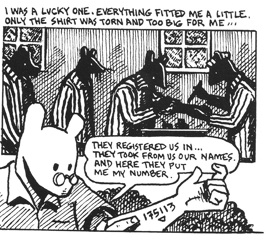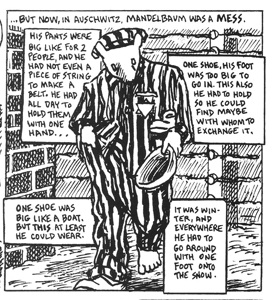This chapter opens with a discussion between Artie and Francoise, more specifically Artie is experiencing some conflict when deciding how to draw / represent Francoise in his novel. Their conversation reveals that Francoise (of French heritage) needed to convert to Judaism in order to marry Artie. Their holiday is interrupted when Vladek calls and informs them that Mala has walked (drove) out on him.
When Artie and Francoise arrive to Vladek’s bungalow he explains the reasons for Mala’s departure. Vladek and Artie take a walk where by Vladek continues to recall the horror of the Auschwitz Concentration Camp.
Vladek openly talks about his long-time friend Yaakov Mandelbaum, who he initially attaches himself to in Auschwitz. The pitiful circumstances of Mandelbaum represent the desperation and anguish of those who were transported to Auschwitz. Vladek described Mandelbaum as merchant from Sosnowiec who was “a very rich man”.
Throughout the chapter Vladek reveals the horror and dismay of arriving at Auschwitz – it is important to remember individuals from all ages were transported and kept in concentrating camps similar to Auschwitz, their perceptions of such an environment would have all been different.
Between July 1942 and September 1944, almost every Tuesday a cargo train left for the concentration camps Auschwitz-Birkenau (65 train-loads containing 60,330 people most of whom were gassed on arrival), Sobibór (19 train-loads of 34,313 people, all of whom were killed on arrival), Bergen-Belsen and Theresienstadt (9 train-loads of 4,894 people some 2,000 of whom survived the war). In the period from 1942 to 1945, a total of 107,000 people passed through the camp on a total of 93 outgoing trains.
The link below is testimony of Sal de Liema, describing his deportation from Westerbork, the conditions during the train ride and the arrival to Auschwitz in September 1944.
Study Questions
- Art explores some of the emotions felt by children of Holocaust survivors. What are some of these?
- What was the fate of the Poles who betrayed Vladek? What does this tell us about the Nazis?
- Vladek explains, “But here God didn’t come.” How hard might it have been to keep faith, and retain hope in circumstances such as these?

